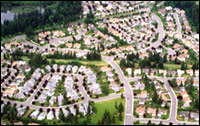
It seems to me there’s a bipartisan consensus forming — at least among the pundit class — that the sensible answer to our energy problems is a stiff gas tax (typically combined with reductions in other taxes, to cushion the blow to the poor). The idea is that such a tax will force people and businesses to start making the necessary changes.
But what are the necessary changes? Anthony Flint has a problem:
… the discussion always comes right up to the ultimate reason we use so much energy — our physical environment and how we live — and then backs away.
This is true. No politician has the stones to question sprawl — where their most coveted voters live — and most mainstream pundits fear the dread tag of "elitism." But Flint’s right: You can’t get around the built environment.
Here’s what he suggests:
Across the country, innovative policymakers are also ready to level the playing field in terms of government regulation and infrastructure investments, which at least since World War II have heavily favored the creation of highways, gas consumption, and sprawling development. What needs to be done is clear, and really isn’t even all that controversial: change zoning to allow mixed-use development in town centers, currently prohibited (perversely, in most cities it’s illegal to build the kinds of development that more and more people are clamoring for). Cut red tape for urban infill development, which is too often too expensive and time-consuming. Shift investment to transit to make growth functional in urban neighborhoods and older suburbs, just as highways have enabled sprawl.
Flint points out, wisely I think, that change is building not because Americans are responding to moral exhortations, but because gas prices are serving as the straw that broke the camel’s back. The personal calculus that makes living in far-flung suburbs worthwhile is changing.
Today, establishing alternative development patterns isn’t going to hinge on saving farmland or protecting endangered species or preserving historic sites. It’s going to come down to convenience, quality of life, and the pocketbook.
Word.


